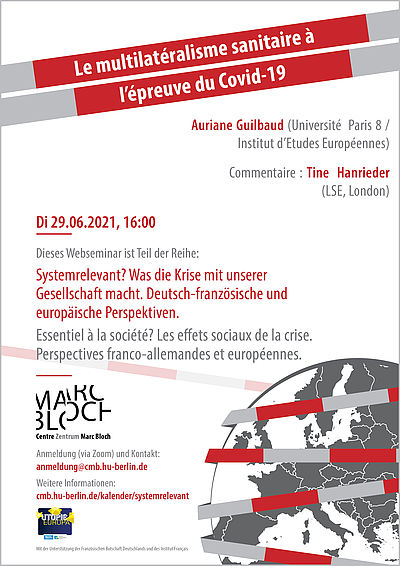Auriane Guilbaud - Le multilatéralisme sanitaire à l’épreuve du Covid-19
June 29 | 16:00
Please note that this event is only held online. External interested parties can register for the ZOOM event at the following address and will receive the access data: anmeldung@cmb.hu-berlin.de
Depuis le début de l’année 2020, la pandémie de Covid-19 a sévèrement ébranlé le multilatéralisme sanitaire. Cette présentation reviendra d’abord sur les dynamiques générales de la coopération multilatérale en matière de santé, avant d’analyser certaines tensions et transformations introduites par la pandémie de Covid-19. Celles-ci concernent notamment le rôle de l’Organisation Mondiale de la Santé, mais aussi de nouveaux mécanismes et principes de coopération multilatérale.
Auriane Guilbaud est maîtresse de conférences en science politique à l’Université Paris 8 (Institut d’Etudes Européennes) et chercheuse au CRESPPA-LabToP (UMR 7217). Spécialisée en relations internationales (doctorat de Sciences Po Paris, 2012), ses recherches portent principalement sur le rôle des acteurs non-étatiques dans les relations internationales, les organisations internationales et les politiques de santé mondiale. Sa page web: https://www.cresppa.cnrs.fr/labtop/equipe/les-membres-du-labtop/guilbaud-auriane/?lang=en
Commentary: Tine Hanrieder (LSE, London)
Tine Hanrieder is Assistant Professor in Health and International Development at the London School of Economics and research group leader for Global Humanitarian Medicine at the WZB Berlin Social Science Center. Her research areas include global health governance, humanitarianism, and labour in the health economy.
This event is part of the cycle
Essential to Society? Franco-German and European Perspectives on the Social Repercussions of the Crisis
We are living through an unprecedented global health crisis. COVID-19 and the ensuing state of affairs have profoundly unsettled our social structures, affecting not only our mental and societal well-being, but also the state of our political and financial frameworks. It has retraced new boundaries between private and public life and intensified the presence of technology in our daily lives. It has compelled us to reconsider our relation to the sciences and the environment. In recent months politicians, researchers and the media offered attempts, ranging from apocalyptic prophecies to ecological utopias, to imagine what the world could look like once the crisis subsides. Yet not only the future, but also the current repercussions of the crisis on diverse facets of our society must urgently be reflected upon.
It is in this context that the Centre Marc Bloch, Berlin, a Franco-German centre for research in the social sciences and humanities with a special focus on Europe’s transformations and position in a global world, seeks to open the discussion to the wider public by launching an online seminar. This discussion series will bring together researchers from a wide range of fields, such as history, philosophy, sociology, political sciences, anthropology, cultural studies, public health and ecology, in order to consider the effects of the pandemic on our society in medias res. We believe the past can assist us in understanding whether the present crisis consists of an exceptional event or an extended transmutation, whether it may strengthen or disrupt our social structures and political organisations, and whether or not it will lead to a genuine revaluation of what is considered "relevant" or "essential" to society. The analysis of society by social sciences and the humanities in times of crisis may permit us, then, not only to take stock of that which transpires, but also to tackle imminent social transformations.
Contact
Chloé Risbourque
risbourque ( at ) cmb.hu-berlin.de
